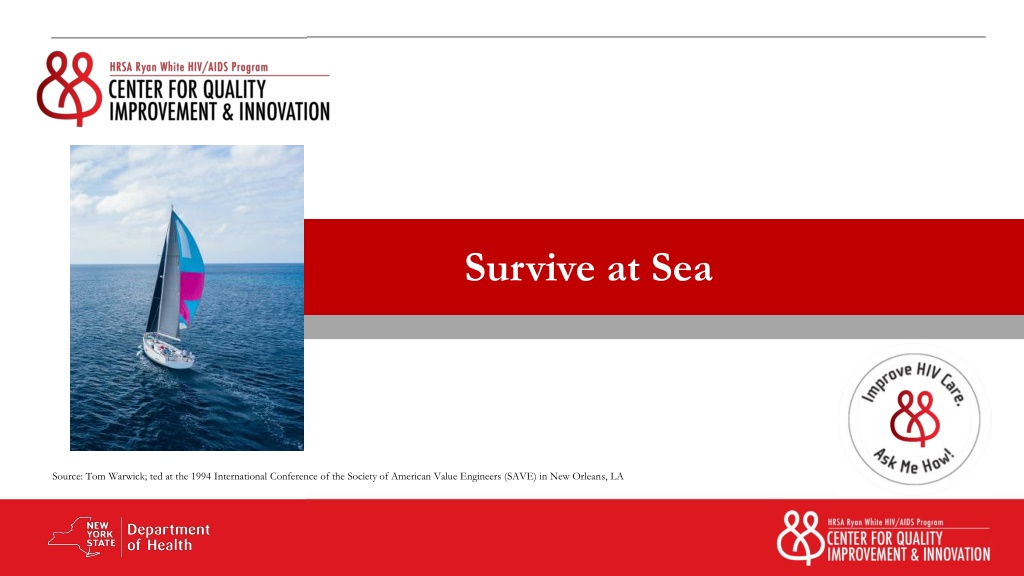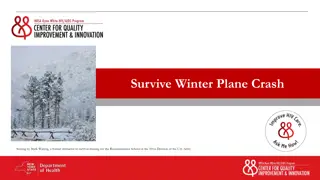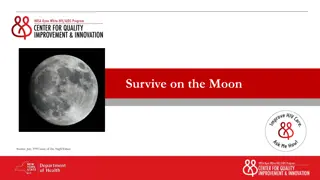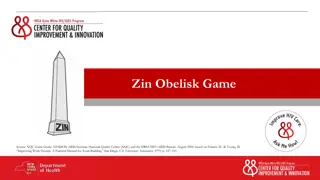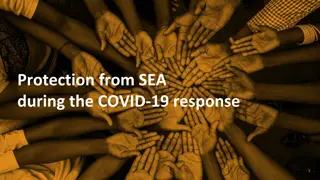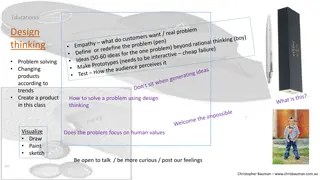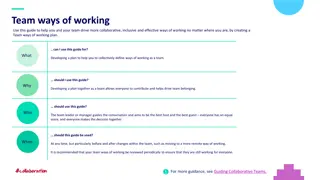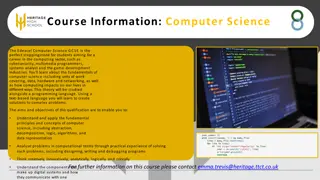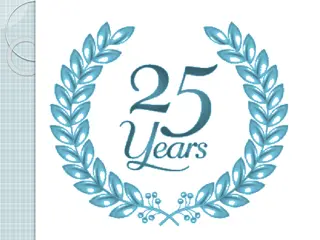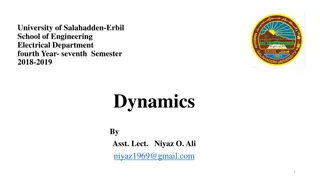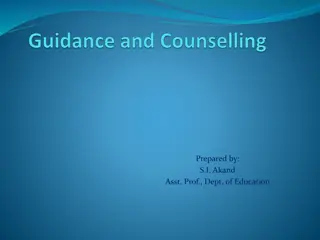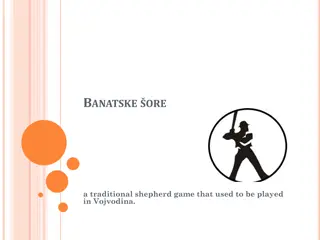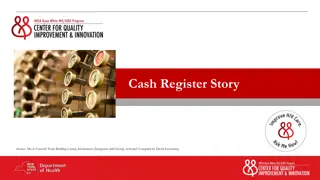Survive at Sea: Team Problem-Solving Game Overview
"Explore the team problem-solving game 'Survive at Sea,' focusing on prioritization and collaboration. Participants face a yacht disaster scenario leading to engaging lessons on teamwork and decision-making. Discover the importance of group dynamics in challenging situations."
Download Presentation

Please find below an Image/Link to download the presentation.
The content on the website is provided AS IS for your information and personal use only. It may not be sold, licensed, or shared on other websites without obtaining consent from the author. Download presentation by click this link. If you encounter any issues during the download, it is possible that the publisher has removed the file from their server.
E N D
Presentation Transcript
Survive at Sea Source: Tom Warwick; ted at the 1994 International Conference of the Society of American Value Engineers (SAVE) in New Orleans, LA
Overview Game: Survive at Sea Type of Game: A team problem solving game that emphasizes prioritization and collaboration. Length: 20-30 minutes Target Audience: Staff, quality improvement team members, people with HIV, and anyone else who are part of a quality improvement team. Learning Objectives Learn about how groups outperform individuals when solving complex challenges. Engage participants in a creative way to demonstrate the importance of team problem solving. Demonstrate the importance of collaboration. Learn how to prioritize and find consensus among team members. Agenda 1. Setting the stage for the interactive exercise. 2. Playing the Survive at Sea game. 3. Debrief and discussion on what lessons learned are and how they apply to HIV care. 4. Feedback and close. For more information | Check out the CQII Virtual Game Guide (2021) at www.CQII.org, including additional games, resources and the corresponding facilitator guide 2
Overview: Survive at Sea Introduction to Game Scenario Individual Ranking Group Discussion and Ranking Debriefing 3
Game Scenario You and your team have chartered a yacht. None of you have any previous sailing experience, and you have hired an experienced skipper and two-person crew. As you sail through the Southern Pacific Ocean a fire breaks out and much of the yacht and its contents are destroyed. The yacht is slowly sinking. Your location is unclear because vital navigational and radio equipment has been damaged. The yacht skipper and crew have been lost while trying to fight the fire. Your best guestimate is that you are approximately 1000 miles southwest of the nearest landfall. You and your friends have managed to save the following 15 items, undamaged and intact after the fire. In addition to the below, you have salvaged a four-man rubber life craft. The total contents of your combined pocket s amounts to a packet of cigarettes, three boxes of matches and 3 $5 notes. 4
Items Recovered A sextant (navigation instrument) A shaving mirror A quantity of mosquito netting 5 gallons of water A case of army rations Maps of the Pacific Ocean A floating seat cushion A 2 gallon can of oil/petrol mixture Small transistor radio 20 sq ft. of opaque plastic sheeting A can of shark repellent One bottle of 160 proof rum 15 feet of nylon rope 2 boxes of chocolate bars A fishing kit & pole 5
Individual Ranking: 3 minutes What are the most important items? Using the Reporting Form, place the number 1 by the most important item, the number 2 by the second most important, and so on through number 15 for the least important. 6
Group Ranking: 20 minutes Form Groups: 8-10 individuals and assign one facilitator, one observer, and a recorder. Discuss the ranking of the recovered items in the group and develop one ranking. Using the Reporting Form, place the number 1 by the most important item, the number 2 by the second most important, and so on through number 15 for the least important. 7
Scoring For each item, mark the number of points that your score differs from the ranking suggested by the US Coastguard, then add up all the points. Disregard plus or minus differences. The lower the total, the better your score. Example: Box of matches Individual Ranking 5 and US Coastguard Ranking 10; count 5 points. Score the individual and group rankings. 8
Experts Rankings Item Rank 15 Coast Guard Logic Item Oil/gas mixture Rank Coast Guard Logic Sextant Useless without the relevant tables and a chronometer Critical item for signaling since it floats on water and can be lit using the matches 2 Shaving mirror Critical for communication since a mirror can generate five million candlepower of light 1 Transistor Radio You would be out of range of any radio station 12 Plastic sheeting Can be used to collect rain water and shelter from the wind, waves and sun 5 Mosquito netting No mosquitos in the ocean, can t be used for deep sea fishing 14 Shark repellent Repels sharks, could be useful, but sharks aren t biggest threat 10 5 gallons of water 5 gallons of water will supply water rations for several days 3 Rum 80% alcohol can be used as an antiseptic, otherwise of little value 11 Army rations This is your basic food intake 4 Chocolate bars Your reserve food supply 6 Maps Useless without navigation equipment 13 9 Fishing kit with pole Ranked lower than chocolate; no guarantee you will catch any fish; he pole could be a tent pole 7 Seat cushion Useful as a life preserver if someone fell overboard 9
Answers to the Survival at Sea Exercise 1. Shaving: Mirror Critical for signaling. 2. 2 gallon can of oil/petrol mixture: Critical for signaling. The mixture will float on water and could be ignited with one of the $5 bills and a match. What the experts don t say is how you get away from this conflagration or what to do if the wind should push the life raft into the flames! 3. 5 gallon can of water: Necessary to replenish fluids lost through perspiration (that s sweat). 4. One case of army rations: Basic food intake. 5. 20 square feet of opaque plastic: Can be utilised to collect rain water and provide shelter from the elements. 6. 2 boxes of chocolate bars: Reserve food supply (what were you going to do with that much chocolate?). 7. Fishing kit: Ranked lower than the chocolate as a bird in the hand is worth two in the bush. There is no guarantee you will catch any fish. 8. 15 feet of nylon rope: Could be used to lash people or equipment together to prevent it being washed overboard. 9. Floating seat cushion: A life preserver if someone fell overboard 10
Answers to the Survival at Sea Exercise 10. Shark repellent: Repels sharks, could be useful, but sharks aren t biggest threat. 11. One quart of 160 per cent proof rum: Contains 80% alcohol, which is enough to be used as an antiseptic for any injuries, otherwise of little value would cause dehydration if ingested (that s drunk to you and me). 12. Small transistor radio: Of no use without a transmitter. You would also be out of range of any radio station. 13. Maps of the Pacific Ocean: Worthless without navigation equipment. It does not matter where you are but where the rescuers are! 14. Mosquito netting: There are NO mosquitos in the midpacific ocean. As for fishing with it? stick to the fishing kit. 15. Sextant Useless without the relevant tables and a chronometer. 11
Scoring 12
Debriefing Did you do better individually or as a team? What were the reasons that the individuals or the teams performed better? How did your team reach its decisions? Was everyone s input considered? How well did the group function as a team? What could be improved? How does this game apply to HIV care and/or your HIV program? 13
Reflections What are the lessons learned from this game? How can a group reach a common goal? Teamwork can produce better results than individual work, especially when faced with complex issues. Healthy team dynamics are critical to teamwork and development; the role of the group leaders/facilitators is important. It is important to take the time to obtain all team members views and perspectives. A benefit of teamwork is often the diversity in culture, opinion, and experience. 14
Center for Quality Improvement & Innovation 212-417-4730 (phone) 212-417-4684 (fax) www.CQII.org Info@CQII.org This project is supported by the Health Resources and Services Administration (HRSA) of the U.S. Department of Health and Human Services (HHS) as part of an award totaling $1.5M. The contents are those of the author(s) and do not necessarily represent the official views of, nor an endorsement, by HRSA, HHS or the U.S. Government. 15
